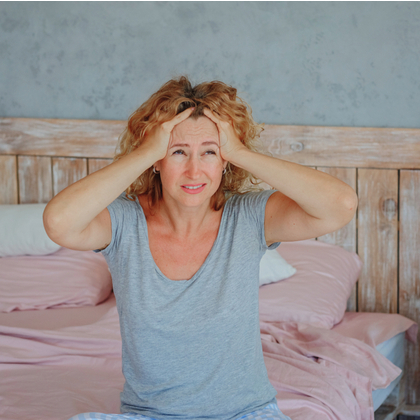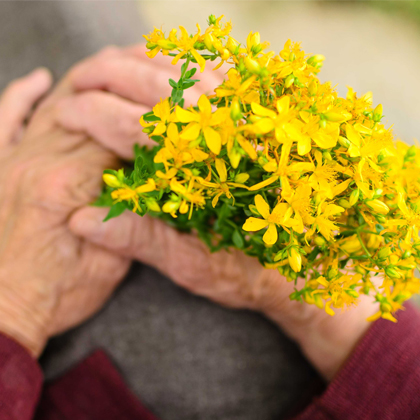
Menopause brings with it many unwelcome physical and psychological changes. One of the most common complaints is sleep problems, with 60 per cent of menopausal women experiencing insomnia and fragmented rest at this time (1). A host of different factors are known to trigger sleep disruptions – from night sweats to increased anxiety – but usually, hormonal changes are at the root cause.
Why does menopause affect sleep?
The main reason you may experience sleep problems in menopause is due to unpredictable hormonal fluctuations. As your levels of oestrogen and progesterone start to decline, this can have a knock-on effect on many other areas of the body and affect sleep quality.

How does menopause affect sleep?
Aside from supporting cognitive performance, cardiovascular health, weight management, and bone health, oestrogen also plays an important role in sleep. This hormone helps the body use serotonin to prime you for rest. As such, higher levels of oestrogen are often associated with higher-quality sleep, whereas lower levels are associated with disrupted rest, which is why you may notice reduced sleep quality during the menopause (2).
Progesterone is another vital sleep-promoting hormone. Besides boasting sedative properties, progesterone also stimulates the production of GABA, a neurotransmitter that supports sleep (3). Low progesterone, therefore, can lead to restlessness and frequent night-time awakenings.
Due to your fluctuating hormones, you may also experience other uncomfortable symptoms that can interrupt rest.
Night sweats
Hot flushes and night sweats, caused by a sharp and sudden decline in oestrogen, are among the most common symptoms you can experience throughout the menopause (4). They mean the same thing, but when hot flushes happen during the night, they’re known as night sweats.
Depending on the severity and frequency of your night sweats, they can rouse you several times during the night, which, inevitably, disrupts your sleep quality. They can also affect the quality of your sleep, even without waking you up (5,6). Find out how to manage your hot flushes using soy here.
Anxiety
Anxiety has also been linked to sleep problems in menopause (7). Getting good quality sleep is vital when it comes to supporting your emotional health, as poor sleep can make you more emotionally reactive, impulsive and sensitive to negative stimuli. Often, stress and poor sleep operate in a negative feedback loop, perpetuating each other.
Perimenopausal hormonal fluctuations and other midlife stressors may also trigger anxiety and further disrupt your sleep. Some women find that taking St John’s Wort can help manage their menopause anxiety. Other women take CBD alternatives, like PEA, to help manage their sleep instead.
Learn more about why the perimenopause causes anxiety here.
Is insomnia a side effect of menopause?
Many women complain of insomnia throughout the menopausal transition, experiencing difficulties falling asleep, frequent night-time arousals, and early morning awakenings. While some menopausal symptoms – namely, hot flushes and anxiety – contribute sleep disruptions in menopause, it isn’t yet clear whether these symptoms cause insomnia or indeed the menopause itself (3,8).
Can the menopause cause snoring?
During this time, you may also develop a sleep disorder, like obstructive sleep apnoea, which can further disrupt your sleep (9). It’s not uncommon to gain weight after menopause, often resulting in larger neck circumference. Due to these changes to the upper airway, your breathing patterns may change while you sleep, and this can lead to snoring.
The ‘apnoea’ in sleep apnoea refers to a breathing pause that lasts around ten seconds (10). This pause alerts the brain and rouses you from sleep, causing decreased overall sleep quality.
Does sleep return to normal after menopause?
In the postmenopause stage (after you have not had a period for 12 consecutive months), your ovaries no longer produce the sleep-enhancing hormone, progesterone, but continue to produce oestrogen — albeit at low levels.
With the calming of hormonal irregularity, most sleep problems and insomnia eventually improve. However, postmenopause is different for every woman, and for some, insomnia may continue for a while (11).
Since quality rest is vital to maintaining your overall health, sleep problems can be hugely debilitating. A lack of sleep can make you feel anxious, depressed and irritable, affect your productivity, lead to forgetfulness, and deplete your energy levels.
If you would like to find out more information on sleep health and how to improve it, we highly recommend visiting our sleep hub. You can also learn more about natural remedies for overcoming menopausal insomnia here.
References:
-
Sleep Foundation. 2020. Menopause & Sleep - Sleep Foundation. Available online: https://sleepfoundation.org/articles/menopause-and-sleep
-
Polo-Kantola P. Dealing with Menopausal Sleep Disturbances. Sleep Medicine Clinics. 2008;3(1):121-131.
-
Lee J. et al., Sleep Disorders and Menopause. Journal of menopausal medicine. 2019;25(2):83-87.
-
Al-Safi. Z., Santoro N., Menopausal hormone therapy and menopausal symptoms. Fertility and Sterility. 2014;101(4):905-915.
-
Lampio L. et al., Sleep in midlife women. Menopause. 2014;21(11):1217-1224.
-
Kronenberg F. Hot Flashes: Epidemiology and Physiologya. Annals of the New York Academy of Sciences. 1990;592(1):52-86.
-
Parry B. et al., Sleep, rhythms and women's mood. Part II. Menopause. Sleep Medicine Reviews. 2006;10(1):197-208.
-
Guidozzi F. Sleep and sleep disorders in menopausal women. Climacteric. 2013;16(2):214-219.
-
Sleep Foundation. 2020. Menopause And Obstructive Sleep Apnea - Sleep Foundation. Available online: https://www.sleepfoundation.org/articles/how-handle-obstructive-sleep-apnea-during-menopause
-
Sleep Foundation. 2020. Sleep Apnea And Sleep. Available online: https://www.sleepfoundation.org/articles/sleep-apnea-and-sleep
-
Hachul H. et al., Sleep in post-menopausal women: Differences between early and late post-menopause. European Journal of Obstetrics & Gynecology and Reproductive Biology. 2009;145(1):81-84.
Related Posts
Disclaimer: The information presented by Nature's Best is for informational purposes only. It is based on scientific studies (human, animal, or in vitro), clinical experience, or traditional usage as cited in each article. The results reported may not necessarily occur in all individuals. Self-treatment is not recommended for life-threatening conditions that require medical treatment under a doctor's care. For many of the conditions discussed, treatment with prescription or over the counter medication is also available. Consult your doctor, practitioner, and/or pharmacist for any health problem and before using any supplements or before making any changes in prescribed medications.

Olivia
Olivia Salter has always been an avid health nut. After graduating from the University of Bristol, she began working for a nutritional consultancy where she discovered her passion for all things wellness-related. There, she executed much of the company’s content marketing strategy and found her niche in health writing, publishing articles in Women’s Health, Mind Body Green, Thrive and Psychologies.
View More



